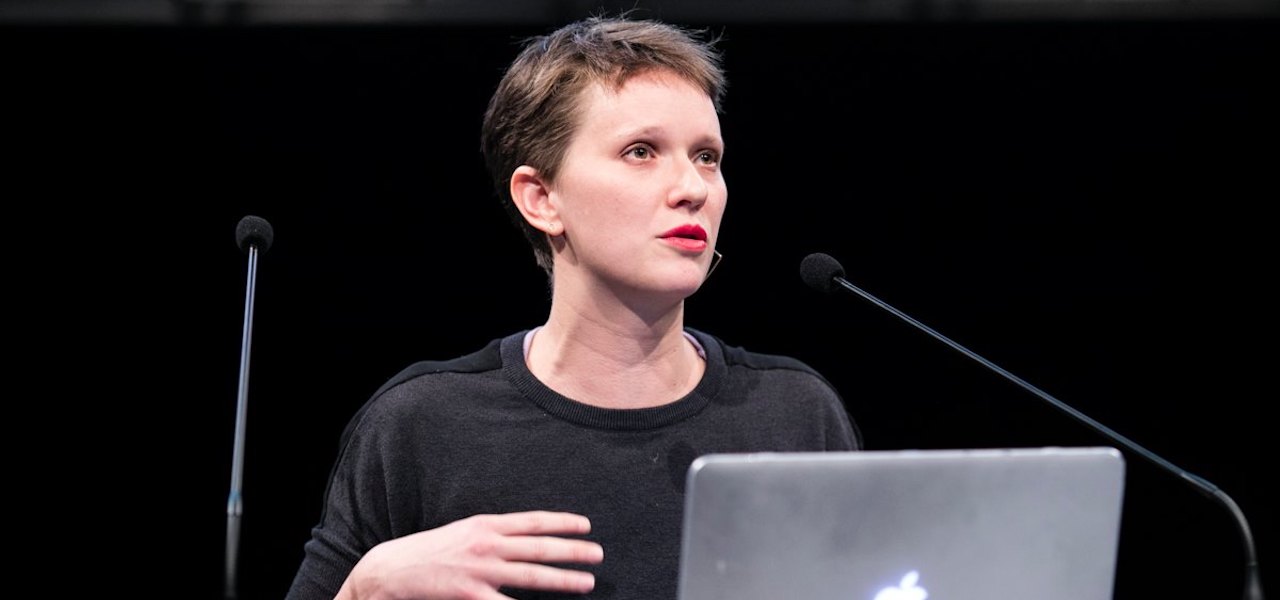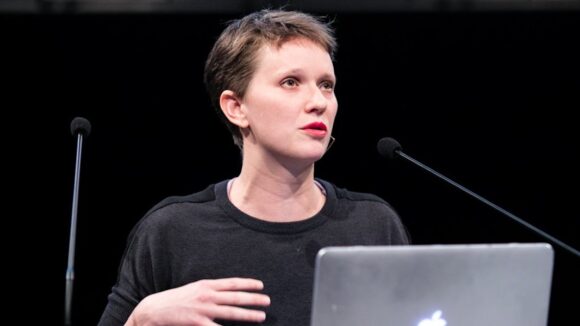

‘Festival Directors: Stop Inviting Problematic Men’ (A Commentary By Luce Grosjean)
On Friday at Animateka festival in Ljubljana, Slovenia, Luce Grosjean gave a short speech about an important — and still under-discussed — subject.
Grosjean, who runs Miyu Distribution in France, called out sexual harassment at festivals and in the animation world in general, and implored festival directors to crack down. With her permission, we are republishing the transcript of the speech in full, along with preliminary comments she added in a Facebook post. We’re also including a video of the speech. Her acknowledgments follow at the end. Here’s Grosjean:
Transcript of talk
I have been running my company for the last five years and it has been strongly connected to me learning about and experiencing the power imbalance between men and women in my industry.
I realized that I had to fight twice more than my male competitors: trying to show my value in a strong competitive world and also to fight to believe in myself. But I have a way to fight it back: I just try to not give too much space to this internal voice and enjoy as much as I can what I am doing.
When the #MeToo movement started, I, like most of the women, was thinking the world will change drastically and the cinema industry will be the safest place to work in. But, two years later, we have to face it: the world didn’t change.
[Roman] Polanski still released a film in cinema theaters in France and it is one of his biggest successes he has known in his career.
A French director well known as a rapist by all the French animation industry is currently making a new feature film.
John Lasseter, after being fired by Pixar, is now running the Skydance animation studio.
My own clients, Illogic Team, the directors of the film Garden Party, signed a contract for a feature film with Bob Weinstein, the brother of Harvey. This is a guy who paid for the harassment settlement for his brother, and benefited from his influence and the fear Harvey had on women during the last 40 years of their professional partnership.
I would love to tell you today that all these problems only happen in feature films. I would love to be glad to be in the small animated short film industry, where the fact that we are working in a non-business-driven part of animation is protecting us. That we are so poor, so equal that we do not have dominant positions. That cinema is an old-school patriarchal industry, and we are in the progressive place for changing the world as we know it.
But we are not.
Some people have more power than others. Male domination can easily exist even on small scales. Who has power? People who are running funding organizations, producers, well-established directors, festival programmers, and of course, us, distributors. That is why I feel free to talk to you today.
And we hear stories. Direct testimonies. Women being harassed, touched without their consent, feeling pressured to do something they may not feel comfortable doing. And today, I want to tell everyone who is in this room, and I hope it will be heard above: I am tired.
Tired of trying to “be understanding.” Tired of trying to make things move, change, or to let it go because you don’t want to impact people who are your friends. Tired of not having our industry affected by bad scandals. Tired of trying to explain to men why it is not okay to have this kind of situation and how it is impacting us, women.
So, if I hear that someone harassed someone else — I mean, let’s be honest and put gender in this sentence: if I hear that a man harassed a woman, in a festival, in a school, in a studio, he will be strongly Persona Non Grata for me. I will tell people about him, I will warn the people who are running the institution where he will be invited, I will warn women about him.
Festivals that will let this kind of behavior happens without reacting, I will also consider them as non-safe places for women. I will warn our female directors before sending their films to their festivals, and if our films are selected, we will make sure that the female directors will have the information before going so they can protect themselves.
Festival directors: you are the people who have the most power today in the little animation short film industry. You give visibility to these men, legitimacy. By inviting them, you are saying that their behavior is okay. And then you bring them into a party full of young women. This shouldn’t have to be said, but apparently it does: you are responsible for the safety of the female guests at your festivals, and you are responsible for the behavior of the men you invite.
Women: speak to each other, don’t be afraid to share your feelings, your experiences. We may have lived through the same thing and we will be stronger together.
To all the people who, like me, enjoy a position of power — distributors, festival programmers, festival directors, funding organizations, teachers, and heads of schools — I hope you will join me in this attitude, because enough is enough.
We are not here to provide free access to women’s bodies without their consent, we are here to celebrate all the talented persons who are doing animation. Let’s keep it that way!
Follow-up comments to speech based on feedback
Some ideas that were shared during the last few days for making festivals and, more generally, the animation industry safer places. These are not rules that you must have, but you can think about how radical you want to be, the reasons that you want to react:
- Stop selecting films of problematic directors.
- Stop inviting them.
- If during your festival you learn that one of your guests is problematic: let your staff know, especially the women, because they are the ones who have to be nice with your guests, and so are the most exposed ones.
- Speak with them because they may not even know they are problematic, especially if you are a male festival director — your voice will be more heard than ours. Don’t let only women deal with these questions.
- Let other programmers know. We know you are speaking to each other.
- Please, believe women. No woman wants to be considered as a victim or name someone for revenge.
- Have talks about feminism and other social issues when [festival attendance is at its highest], in the beginning, so people can share their thoughts during the whole festival.
- If you are asking women to speak about feminism, ask men to share their thoughts about ways they are benefiting from being a man. We and men should have equal time to speak about our work. Our jobs are not being women.
I am closing this here, but hopefully it will be a continuing conversation until equality is real.
Acknowledgments
I would like to thank all my friends and colleagues who were at my speech and supporting me, especially Draško Ivezic and Luca Tóth (who filmed it), Chintis Lundgren, Flóra Anna Buda (thank you for the beautiful nice visual behind me, which encouraged me), and Igor Prassel and the whole Animateka team who let me make this announcement; all the festivals programmers; and all the people who were there and started to think and talk about these questions. I feel relieved that our community started to speak about all of these questions and already try to change the system.
(Grosjean followed her speech with a talk about distributing animated short films. Image at top courtesy of Animateka.)

